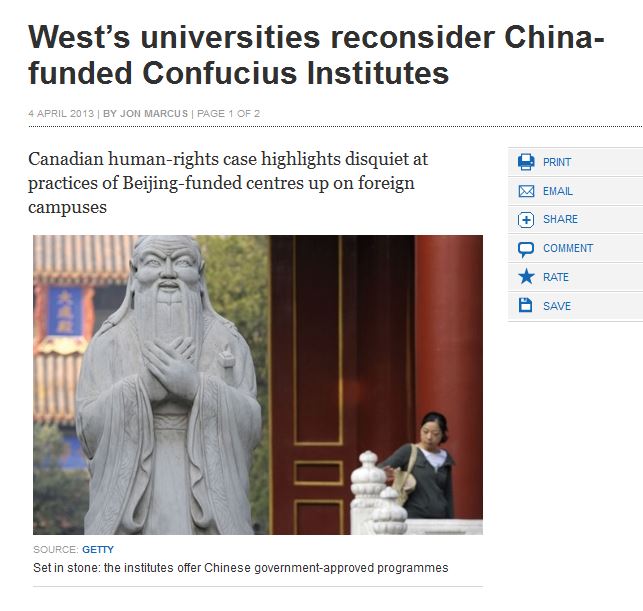Confucius Institutes: how they are perceived
This piece in The New York Times was published a couple of years ago after the University of Pennsylvania became the latest US university to turn down China’s offer to set up a Confucius Institute on campus. An excerpt:
For Arthur Waldron, a professor of international relations at the University of Pennsylvania, the key issue is academic independence.
“Once you have a Confucius Institute on campus, you have a second source of opinions and authority that is ultimately answerable to the Chinese Communist Party and which is not subject to scholarly review,” he said.
“You can’t blame the Chinese government for wanting to mold discussion. But Chinese embassies and consulates are in the business of observing Chinese students. Should we really be inviting them onto our campuses?”
There’s also another good piece about the situation with Confucius Institutes on Canadian campuses – a report in The Times (London) Higher Education supplement.
14 Comments Comment
Leave a Comment



http://www.nytimes.com/2012/03/05/us/critics-worry-about-influence-of-chinese-institutes-on-us-campuses.html?pagewanted=all&_r=3&&
http://www.timeshighereducation.co.uk/news/wests-universities-reconsider-china-funded-confucius-institutes/2002870.article
Why don’t we ask Juanito Camilleri? He was beaming with joy when he opened one at the University of Malta.
This from the country that kicked out the British Council.
You mentioned the one guy who’s been sitting on the fence all his life, ipappija minn zewg nahat, pompous and arrogant with a Nationalist government and brown-nosing anyone and everyone that’s Labour. Shame on Juanito.
This isn’t about party politics. And by the way, very few of my comments are.
This is about the job description of the head of an academic institution in Europe. It’s about making sure that the activities of his institution do not include the sort of dangerous unscientific nonsense that goes by the name of “Chinese medicine”. It is about defending freedom of speech, denouncing dictatorships, and most of all, about upholding that most sacred of things which is at the heart of Western academia – dialectic.
In other words, everything that is the antithesis of the Confucius Institute.
Juanito Camilleri is no better than most of the comfortable sycophants who occupy tenured positions in Maltese academic and scientific institutions. And he is a scientist of sorts, which makes it worse.
But heaven forbid that we should publish a (badly written) lurid novella.
The Maltese brain is dead, my dear Wenza. Everywhere. It is negative to disapprove of anything. All hail the lowest common denominator. All hail anything that comes with a hefty financial package. All hail blind cupidity. So we smile and shake hands, and acquiesce.
I don’t know where this will lead us, but it looks grim. Juanito Camilleri heads an institution that’s almost five centuries old. He has let us all down.
@ H.P. Baxxter – Don’t take Wenza’s comment as political. She described Juanito Camilleri perfectly.
He is the head of an academic institution in Europe but given the way he operates he will never qualify to meet your expectations or what is required of the position he holds.
This is true of others. That is why Wenzu Mintoff is not fit for purpose. You cannot suddenly change a person just by promoting him to a position of trust, responsibility and prestige.
Evarist Bartolo’s ecstatic that China’s going to open Confucius Institutes in Malta’s primary schools.
Of course he is – now he will have the Chinese spying on our children saving him the bother of trying to do it himself and making a real mess out of it.
As they say across the pond ‘money talks and bullshit walks’.
What’s that about the LSE’s Chinese Institute (in the above graphic), Daphne?
[Daphne – You can read the full report here: http://www.timeshighereducation.co.uk/news/wests-universities-reconsider-china-funded-confucius-institutes/2002870.article ]
The irony is that Confucius Institutes are named after a man whose ideas preclude neither democracy nor human rights. The issue has been part of scholarly debate for quite some time, and quite a lot of material exists demonstrating that Confucianism in its totality is not really compatible with the Chinese authoritarian regime.
As in most cases of cultural relativism, the Chinese state just twists ideas for its own ends. Confucius Institutes are an extension of the false propaganda it uses, trying to sell the idea that China is incompatible with democracy to the West and deliberately omitting hard-pressing issues showcasing the dark side of its policies. Confucius himself is probably turning in his grave as we speak.
If Juanito Camilleri or whoever is responsible for keeping the Confucius Institute going at the University of Malta had a shred of academic integrity, they would have removed this abomination long ago.
If they had a shred of integrity, they wouldn’t have allowed the institution to set up in the first place.
Oh most definitely.
Why is Anthony Frendo director of the Confucius Institute? His expertise is entirely unrelated to China.
Is this a way of lending scientific integrity to a propaganda station?
Sounds similar to the way Arabic was forced upon Maltese children under Mintoff. Which is a pity because Arabic, like Chinese can be pretty useful.